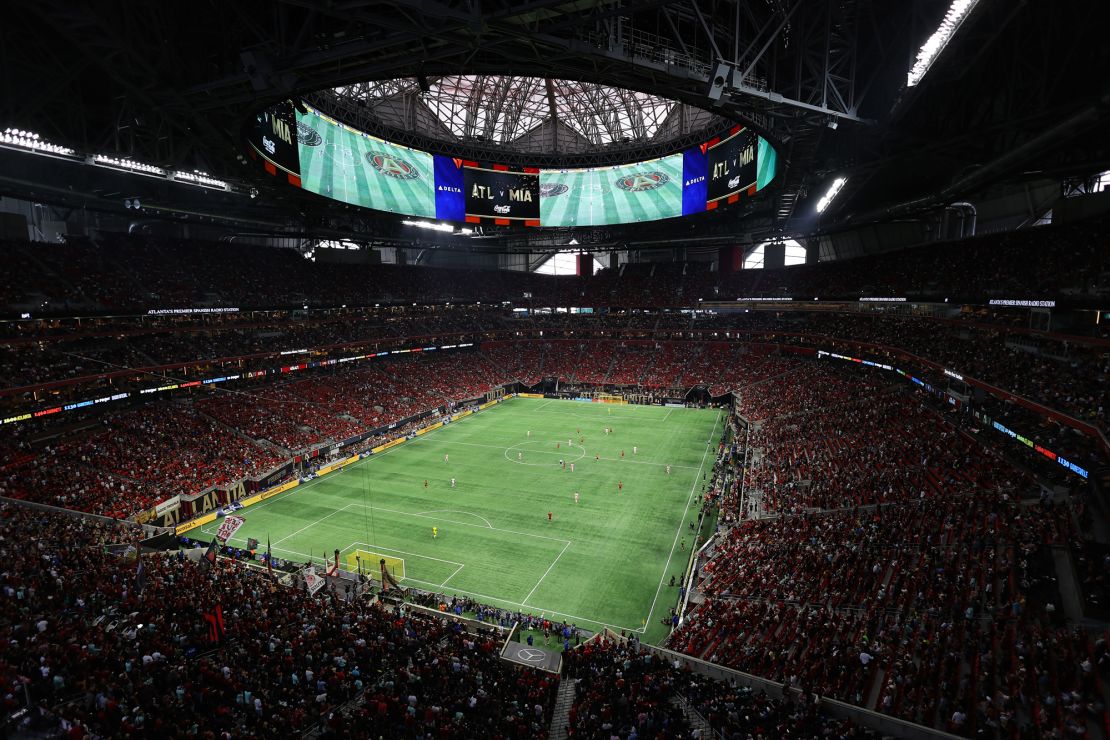CONMEBOL announces 14 host cities for 2024 Copa América as tournament returns to the US

CONMEBOL, South America’s soccer federation, has announced the 14 cities that will host matches at the 2024 Copa América as the tournament returns to the United States for the first time since 2016.
The 14 cities are Las Vegas (NV), Arlington (TX), Charlotte (NC), Orlando (FL), Miami Gardens (FL), Santa Clara (CA), Atlanta (GA), East Rutherford (NJ), Houston (TX), Austin (TX), Inglewood (CA), Glendale (AZ), Kansas City (KS) and Kansas City (MO).
The tournament opener will be played at Atlanta United’s Mercedes-Benz Stadium, with the final taking place at Miami’s Hard Rock Stadium.
It will be only the second time, after the special centenary Copa América in 2016, that the tournament has been hosted outside of South America.
Ecuador was originally designated as the tournament host but pulled out in November 2022 due to economic and security concerns, as well as a lack of viable stadiums.
That reportedly left just the US and Peru as the two nations willing to host the 2024 edition, with CONMEBOL and CONCACAF – the federation for North America, Central America and the Caribbean – jointly choosing the US in January of this year.

Though the US unquestionably has better stadium infrastructure than any South American nation, the decision to once again host the tournament stateside led to some criticism in Latin America.
“South America is having a hard time organizing its historic national team tournament,” Ezequiel Fernández Moores wrote in Argentine outlet La Nación in February.
CONMEBOL has encountered obstacles in hosting the last three editions of the Copa América held in South America. In 2015, the host nation was changed from Brazil to Chile due to the former already hosting the 2014 World Cup and 2016 Olympics.
Colombia was set to co-host the 2020 edition with Argentina, before it was postponed by a year due to the Covid pandemic. Protests across the country the following year led to Colombia withdrawing as co-host, with Argentina following suit soon after as the country grappled with high Covid cases.
The tournament was eventually moved to Brazil and played behind closed doors.
Now, for the third edition in a row, the host nation has been changed after the US took over organizing duties from Ecuador.
However, Fernández Moores questioned why the same scrutiny, particularly around safety, isn’t applied to the United States.

“It doesn’t matter that games can be played in California, the State that has just suffered four mass shootings in just 10 days in January,” Fernández Moores wrote.
“For the third year in a row, the United States suffered more than six hundred mass shootings in 2022. In the first three weeks of 2023, there have already been 39 shootings.
“It is unthinkable that CONMEBOL for its 2024 Copa América or FIFA for its 2026 World Cup would demand that the United States review its festival of naturalized violence, which kills in shopping malls, schools or on any street.”
But hosting the 2024 Copa América is undoubtedly a huge boost for the USA as the country gears up to jointly host the 2026 World Cup alongside Canada and Mexico.
In a country where soccer is still sometimes played in the shadows of the NFL, NBA, MLB and NHL, a successful tournament for the US Men’s National Team could play a huge role in boosting national interest ahead of 2026.
The 2016 edition was an overwhelming success, too, registering a record average attendance of 46,000 and becoming the most lucrative Copa América to date, according to La Nación.
Coupled with Lionel Messi’s arrival at Inter Miami, which has garnered worldwide attention and caused spikes in ticket sales and attendances, the 2024 Copa América could prove to be a perfect warm-up of sorts for both organizers and fans alike.

Messi’s matches for Inter Miami have drawn star-studded crowds, while tickets – for both home and away games – are in huge demand, although the club has received criticism for hiking season ticket prices for next year and pricing out fans who had been loyal to the team prior to Messi’s arrival.
It’s unclear whether Messi’s stateside adventure will boost soccer’s popularity in the US long-term, but perhaps few people will care as long as there is plenty of money to be made while he’s still in Miami.
But the Argentine’s arrival hasn’t just boosted the coffers. His utterly dominant performances on the pitch – which have at times looked laughably easy – led Inter Miami to its first title in the club’s five-year history by helping the team win the Leagues Cup just months after joining.
Such has been his influence in 2023 after guiding Argentina to World Cup glory at the end of 2022, Messi was named TIME’s Athlete of the Year on Tuesday.
“At 36, two decades into his unparalleled career, Messi provided a singular stimulus to soccer in America. Attendance, ticket prices, merchandise sales, and viewership soared. His games took on the feel of a religious revival,” Sean Gregory wrote in TIME.
“With the US hosting three major international tournaments in the next three years (Copa América in 2024, the FIFA Club World Cup in 2025, and the grandest of them all, the World Cup, in 2026), it’s sure to attract even more fans. But Messi is an accelerant.
“With the most revered and influential athlete on the planet playing in Miami for at least the next two years, still performing at the top of his game – he won another Ballon d’Or as the world’s player of the year, his eighth, in late October – the US is now a soccer nation. A fútbol nation.”
Source: CNN










